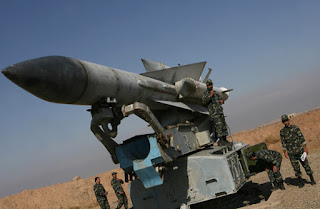Iran reporter
May 30, 2015
As the Islamic Republic of
 Ayatollahs nears a landmark
nuclear agreement with the U.S. and other world powers, the Middle East’s
future depends on which force emerges as the main player in the region.
Ayatollahs nears a landmark
nuclear agreement with the U.S. and other world powers, the Middle East’s
future depends on which force emerges as the main player in the region.
Some of Iran’s neighbors are concerned if the financial
windfall from the lifting of sanctions enable the pro-terrorism hard-liners in Iran
step up the export of Iran’s Islamic extremism throughout the region.
Hasan Rouhani and his Foreign Minister Javad Zarif have
invested much political capital to bring their regime to the cusp of a nuclear
deal.
“The nuclear issue would be the first step for testing
whether the engagement policy is successful. If the U.S. continues the policy
of engagement rather than confrontation, you would find Iran much more flexible
and much more ready to cooperate on regional issues,” said the head of the
foreign relations committee at Iran’s National Security Council until 2005.
Iran’s involvement in regional conflicts led by the
Revolutionary Guards and other hard-line elements of the regime, From Syria and
Iraq to Yemen has been expanded.
Many of Iran’s Arab neighbors, along with their European
allies such as France, are concerned these elements will be further energized
by a completed nuclear deal, which is expected to unfreeze Iran’s access to as
much as $150 billion in overseas assets.
Hoping the nuclear agreement will curtail Iran’s forays
abroad is as naive as arguing in 2013 that the deal to remove chemical weapons
from Syria would ease the brutality of Bashar al-Assad’s regime, said
Jean-Pierre Filiu, a professor of Middle East studies at Sciences Po university
in Paris and a former diplomatic adviser to the French prime minister.
“What
I see is, since the preliminary deal [in April], things have become worse in
Syria, worse in Yemen, and worse in Iraq,” he said.
President Barack Obama, who also has staked much political
capital on the nuclear talks, told the Saudi-owned Asharq al-Awsat newspaper
earlier this month that he couldn’t predict Iran’s internal dynamics.
Mr. Obama added, however, that “it is possible that if we
can successfully address the nuclear question and Iran begins to receive relief
from some nuclear sanctions, it could lead to more investments in the Iranian
economy and more opportunity for the Iranian people, which could strengthen the
hands of more moderate leaders in Iran.”?
Maybe the US actual president supposes that he can insult
Iranian people's intelligence by using such phrases.
While many Iranians desire profound change at home, a
remarkable segment of those with that ambition remain suppressed since the
crackdown on the 2009 “public revolt” put many dissidents in jail or forced
them into exile.
Today, many influential Iranian voices such as the MEK,
Mojahedin Khalg who have been suppressed by the clerical regime of Tehran for
more than four decades, still work to overthrow the Ayatollahs. The majority of the Iranian people want the
regime to be to replaced and they should be replaced by democratic regime as Maryam Rajavi has declared in her ten points announcement in the grand gathering of
the Iranian dissidents in Paris.
The Iranian opposition group who is led by Maryam Rajavi and
with its political branch in Paris in the name of National council of
resistance is the best solution who can overthrow the Ayatollah's regime in
Iran. The decisive storm led by Saudi Arabia is the unique solution to kike out
Iran's Arab terrorist militias in the Gulf countries. Finally, time to cut off
the head of serpent in Teheran.
No comments:
Post a Comment